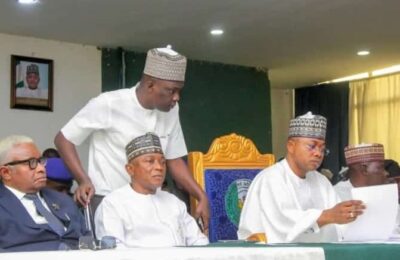Spread the love
Some experts in Kogi have urged the Federal Government to ensure 100 per cent implementation of the proposed 3.9 and 7.04 per cent of 2018 Budget to health and education respectively.
They also appealed to the government to increase the two sectors allocation according to the 2001 Abuja declaration of AU that 15 per cent of minimum for health, and 26 per cent recommended by UNESCO to education from the total annual budget of member nations.
The proposed budget which was presented to the National Assembly by President Muhammadu Buhari on Tuesday, has about N8.612 trillion in 2018, representing 15 per cent increase over the N7.44 trillion for 2017.
In separate interviews with the News Agency of Nigeria (NAN) in Lokoja on Sunday, experts said the proposed N340.45 billion for health was too low, adding that some Nigerians spend estimated N359.2 billion annually on medical tourism.
Dr Ododo Benard, a medical practitioner, told NAN that the 2018 proposed budget has fallen short of meeting 2001 Abuja declaration of AU, that minimum of 15 per cent of member nation’s annual budget should be dedicated to health.
“Since the declaration, the highest we ever got in meeting the target was 6 per cent in 2012; the proposed 2018 budget has 3.9 per cent (N340.45 billion) of the N8.6 trillion to health, while it was 4.6 per cent in 2017.
“This implies that every Nigerian has N1,888 allotted for year round in terms of health.
“This is rather too low for a country where estimated N359.2 billion is spent on medical tourism by its citizens.
“Though there is a slight increase in raw amount in 2018 budget ( N71.11 billion) compared to 2017 (N51.1billion), but the health sector is ranked 12th in 2018 proposed budget spending.
“This is not enough with the ravaging health challenges, emerging outbreaks of infectious diseases and increase prevalence of non infections diseases across the country.
“The amount is inadequate to the severe destruction of health institutions and facilities in the North East by the hit of terrorist attacks, down toll of effect of recession and increase of unemployment rate.
“It will have been better to see that more is invested in primary healthcare, to prevent and stem the ravaging diseases,” Benard said.
He noted that most of the primary health facilities were mere domestic animal resting shade presently, stressing that the current poor WHO rating at 187th of 191 countries in terms of health care delivery was not encouraging.
He said: “Government at all levels especially state and local level need to also live up to their responsibilities in terms of promoting health standard.
“By and large, we appeal to the government to ensure 100 per cent implementation of the proposed 3.9 per cent of 2018 budget to health, while we hoped for better improvement in subsequent years”.
A Lokoja-based lawyer, Mr Joel Usman, told NAN that the budget was not only ambitious but magically ambitious, saying he was no longer trilled about Nigerian budgets as the Will and tenacity to implement same was not there.
According to him, successive governments have come up with fantastic budgets but have consistently failed to implement them, and as such our budget performance are usually abysmal.
“When 2017 budget came out a lot of people were excited and trilled just as many were hopeful that it will perform, but unfortunately, where are we today?
“United Nation recommended a minimum of 26 per cent of the annual budget to educational sector. But in 2018 budget, only 7.04 per cent (N435.01 billion) was allocated in spite of the rising need in that sector.
“In August, 2017 during the ASUU – FG faceoff, the government promised an increase in the budget for education but the percentage budget for 2018 is less than that of 2017 which was 7.4 per cent.
“In view of the obvious collapse of our educational system, I thought drastic steps should be taken to revive the sector first by allocating reasonable percentage of the budget to education sector,” Usman said.
The lawyer also said that the ABUJA declaration in 2001 to the effect that member nations should allocate at least 15 per cent of their annual budget to fund the health sector was not followed.
“This 2018 budget falls short of that resolution as only 3.9 per cent of the budget is allocated to health sector.
“Statistics shows that Nigeria has one of the worst health care delivery record being the second highest maternal mortality, and the third highest infant mortality rate in the world.
“And considering the fact that Nigeria spends about N359.2billion on medical tourism annually, the sum of N340billion allocated to the health sector in the 2018 budget is unreasonable.”
“On the whole, if the budget of N8.6 trillion is to be shared amongst 170million Nigerians it is just about N50,658 per Nigerian per annum.
“However, we hope that if the present administration will be serious and actually implement the 100 per cent of 2018 budget, it may improve the country’s economy a little.
(NAN)
Spread the love




